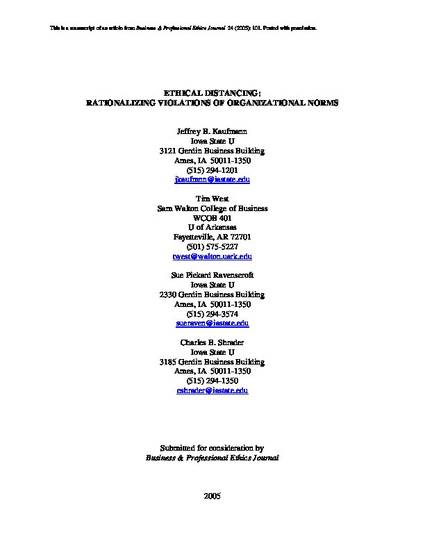
Article
Ethical Distancing: Rationalizing Violations of Organizational Norms
Business & Professional Ethics Journal
Document Type
Article
Publication Version
Submitted Manuscript
Publication Date
10-1-2005
Abstract
Recent work on moral reasoning has focused on the psychological relationship between the actor, the action and the outcome. The argument is that a tighter connection between these categories leads to more moral behavior. Using data from students who cheated on an exam, we extend this literature by delineating how people can rationalize non-moral behavior by loosening the above relationships. In particular, we found that students tried to distance themselves from the wrongfulness of cheating using four types of rationalization: separating themselves from the action, blaming a third-party for influencing the decision, re-defining the action as something good, and defining alternate outcomes from the behavior. Supporting these rationales are nine basic arguments based on confusion, character, professor clarity, attractive nuisance, culture, intent, acceptance, comparisons and outcome. We conclude by discussing the implications of these findings for our understanding of moral reasoning and provide some practical approaches for minimizing this behavior.
Copyright Owner
Philosophy Documentation Center
Copyright Date
2005
Language
en
File Format
application/pdf
Citation Information
Jeffrey B. Kaufmann, Tim West, Sue Ravenscroft and Charles B. Shrader. "Ethical Distancing: Rationalizing Violations of Organizational Norms" Business & Professional Ethics Journal Vol. 24 Iss. 3 (2005) p. 101 - 134 Available at: http://works.bepress.com/cshrader/14/

This is a manuscript of an article from Business & Professional Ethics Journal 24 (2005): 101. Posted with permission.